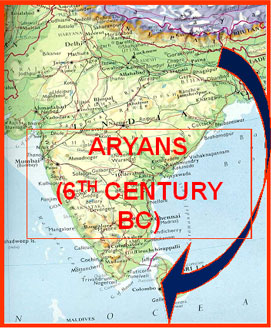HISTORY
Sri Lanka has been a settlement since pre-historic time and evidence exists of Stone Age hunters, food gatherers and rice cultivators. Very little is known of this period and documented history begun with the arrival of the Aryans from North India.
With the arrival of Aryans from North India they first settled in dry north-central region around 6 Century B.C and civilization centered on cities of Anuradhapura.
The Aryans introduced the use of iron and an advanced form of agriculture and irrigation. They also introduced the art of government. Of the ancient Aryan settlements, Anuradhapura grew into a powerful kingdom under the rule of King Pandukabhaya. According to traditional history he is accepted as the founder of Anuradhapura
During the reign of King Devanampiya Tissa, a descendant of Pandukabhaya, Buddhism was introduced to Sri Lanka in 247 B.C. (3rd century BC.) by Arahat Mahinda, son of Emperor Asoka of India. This is the most important event in Sri Lanka history as it set the country on the road to cultural greatness. As a new civilization flourished, Sri Lanka became rich and prosperous. Buddhism and a sophisticated irrigation system became the pillars of classical Sinhalese civilization.
As a result of invasions from South India, the Kingdom of Anuradhapura fell by the end of the 10th century A.D. Vijayabahu I repulsed the invaders and established his capital at Polonnaruwa in the 11th century A.D. Other great kings of Polonnaruwa were Parakrama Bahu the Great and Nissanka Malla, both of whom adorned the city with numerous buildings of architectural beauty. Settlement further moved southwards across the island from Polonnaruwa, Dambadeniya, Kurunegala, Kotte to Kandy.
Buddhist-Sinhalese civilization effected by colonial eras of Portuguese (1505-1716) Dutch (1716-1796)and British (1796-1948). In 1815, Ceylon became Britainís first crown colony. They also introduced Christianity to the island.
In 1815, the Kingdom of Kandy was ceded to the British who thus established their rule over the whole island. Modern communications, western medical services, education in English, as well as the plantation industry (first coffee, then tea, rubber and coconut) developed during British rule. By a process of peaceful, constitutional evolution, Sri Lanka won back her independence in 1948 and is now a sovereign republic with membership in the Commonwealth of Nations and the United Nations Organization.



|